Back to The Riders of the Plains.
The following is an excerpt from The Riders of the Plains: A Reminiscence of the Early and Exciting Days in the North West (1905), by Cecil Edward Denny. This work is in the public domain.
Continued from Chapter XV – Arrival of Sitting Bull.
Chapter XVI
Treaty of 1877 Described
MAJOR CROZIER HAD laid out the grounds of the camp, having all in readiness for the arrival of the Governor’s party.
The river bottom at the Blackfoot crossing on the south side of the river, where the treaty was held is of great extent, being some three miles long by about one in width with plenty of wood along the river, and good feed for horses on the open bottom itself.
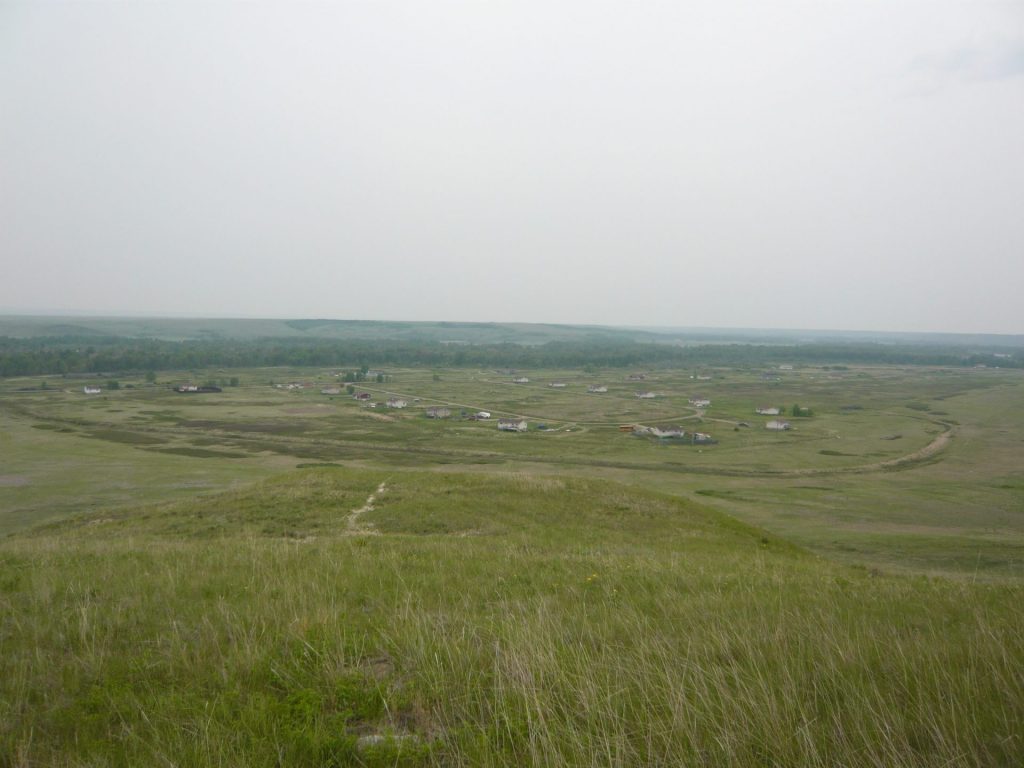
There must have been nearly 1000 lodges of Indians camped on both sides of the river, as they had by this time nearly all come in, bringing with them large supplies of buffalo meat dried, they having only just left the herds of buffalo, down the river to the east. Their bands of horses were in thousands and covered the uplands to the north and south of the camps. There were Indian herders over the separate bands both day and night. It was a thrilling sight, these thousands of horses grazing, with the Indians constantly riding among them, and with the white Indian lodges without number along the river bottoms as far as the eye could reach.
There was the howling of countless dogs and constant drumming in different tents, night and day. There was always either a dance in progress, some medicine being made, incantations over the sick or for successful hunts or war expeditions. It was a sight only seen once. Never again in this country did such a camp of Indians congregate.
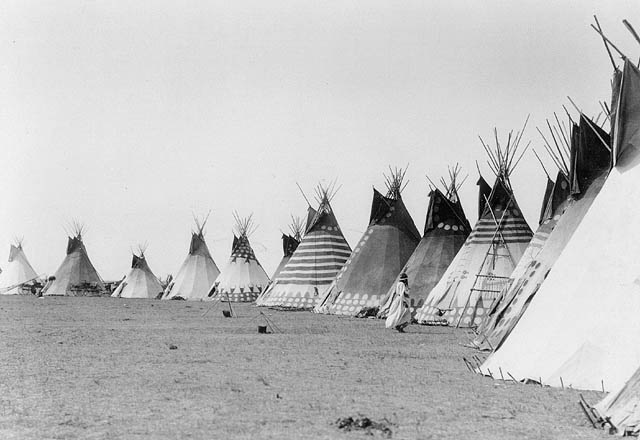
The camp consisted of Blackfeet, Bloods, Piegans, Sarcees, Stonies, and many Crees drawn there from curiosity. There were numberless tents of half-breeds who hoped to derive some gain from the annuities paid to the Indians. Traders from all parts both north and south had arrived and set up tents in which they displayed their stock of blankets and other goods. These men were already doing some trade in robes, for although the summer robes are of no market value, there were many hundreds in camp over from the last winter’s hunts.
Numerous bands of horses were brought in to trade, by white men from Montana, as in those days a fair sized pony, or one that would make a buffalo runner would always fetch a good price from the Indians.
I.G. Baker & Co. and T.C. Powers Bros. had both set up large stores, built of logs and covered with canvas. Their stock of goods was large and assorted, consisting chiefly of clothing, blankets, tobacco, tea, sugar, ammunition and rifles. The Hudson’s Bay company also had their store here, and their chief trader in the country, Mr. Hardisty of Edmonton, with his family, was on the spot, together with his relative, John McDougall of Morleyville, who had succeeded his father as missionary to the Stoney Indians. He accompanied those Indians to give them the benefit of his advice, they camping on the north side of the river, away from the main body of Blackfeet, with whom they were not on the best possible terms.
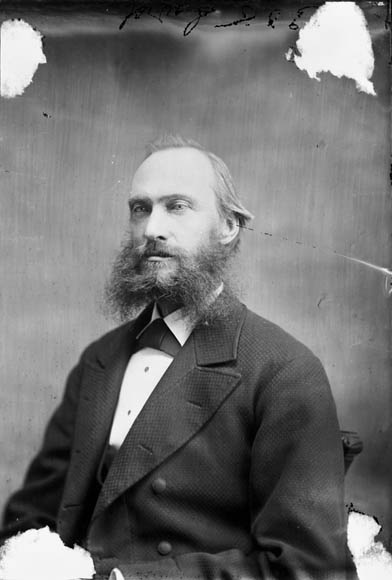
The Governor and police escort of about 60 men arrived after we had been on the ground some days, and camp was at once pitched, a large tent being also erected as a council tent. It took some days before everything was ready to go on with the treaty, and the chiefs of all the tribes met the governor and officers of the force day after day to discuss the preliminaries, and more than once it looked as if all chance of making a treaty would have to be abandoned. The Indians more than once were on the eve of moving their camps and leaving the grounds, on cause of this delay being that old jealousies, between not only different tribes, but different individuals, had to be adjusted, and the patience shown by the commissioners was beyond all praise.
However after about a week of talk and negotiations, the terms of the treaty were finally agreed upon, and the next day was set for signing the treaty by the different chiefs and head men, or the reading of it to all Indians assembled, and the final witnessing thereof.
The treaty was to the effect that the Indians agreed to give up all and whatever claim they might have to the land in Treaty No. 7, comprising that portion of the country from the Bow river to the boundary line and from the mountains as far east as the Cypress hills. They were to receive from the dominion government in cash each year $5 per head each man, woman and child forever. The chiefs were to receive $25 and the minor chiefs $15. There were two head chiefs to both the Blackfeet and Bloods, the other tribes having one each with the number of minor chiefs in proportion to the strength of the tribe.
They were also to have a reservation laid out as soon as possible for each tribe. The Blackfeet and Bloods however, received theirs together, on the Bow river. This was changed the following year, the Bloods getting their reserve about eighteen miles south of Ft. Macleod, between the Belly and St. Mary’s rivers.
The Indians, when they chose these reserves took the pick of the country, and this land being theirs forever, was a most valuable gift, although not thought to be so at that time, as no one then dreamed of railroads being built, or the country ever becoming settled.
The Indians were also offered cattle, but with the exception of the Piegans and Stonies, they refused to take them and scoffed at the idea. Those two tribes received their cattle some years later, and have done well with them, their herds having increased and they are making a good start toward stock raising.
They were also to receive ploughs, harrows and other tools as soon as they were ready to settle on their reserves, and a small supply of clothing was to be given the chiefs and minor chiefs every three years. All the head chiefs received a large silver medal commemorating the treaty. The Indians had the right to hunt over and travel in any part of the Northwest, they being amenable to the law of the country, and the government reserved the right of way for all roads whatsoever, through their reservations. This was about the sum and substance of the treaty then made, and after many days of great anxiety it was finally signed and witnessed. The chief interpreter at this treaty was an old Hudson’s Bay Company employee named Bird, who had lived with the Blackfeet for many years, who had married a Piegan woman, and who could speak both Blackfoot and English perfectly.
After the treaty was finally made and signed, the business began of paying the Indians, it being agreed that this first payment should be double that or those to come after, so that each individual Indian was to receive at this payment $10, and each chief and minor chief $25 and $15 respectively. The treaty was finished on Saturday, and the payments were to begin on the following Monday.
The Sarcee Indians also were to have their reserve with the Blackfeet at the crossing, but as they could in no way get along together, they had a separate reserve given them two years afterwards, near the present town of Calgary, their reserve being on that account the most valuable of all to-day.
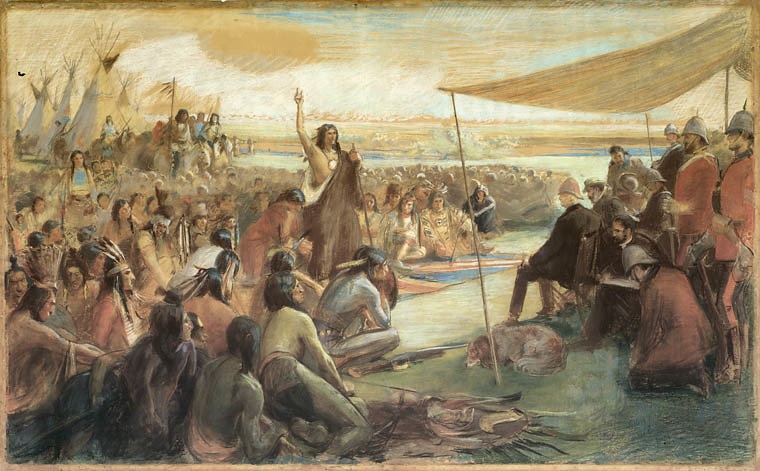
On Sunday, church parade was held, and with the exception of the camp guard, all attended service. The Indians had been in a state of excitement all the morning, and while we were at service five or six hundred mounted warriors, stripped with the exception of a blanket round the loins, and in their war paint and feather head-dresses, started a mounted war-dance round our camp. These men were all armed with Winchester rifles, and on the dead run circled round us firing off their rifles, loaded with ball, in the air, the whistle of the bullets often coming unpleasantly near. This, together with their unearthly yells, was far from pleasant. They were half in fun, half in earnest, and had fear been shown by us, it is hard to tell what would have occurred- a very little would have made the war dance one of grim earnestness, but we went quietly on with the service, and after a while the Indians tired themselves out, and by degrees returned to their camps.
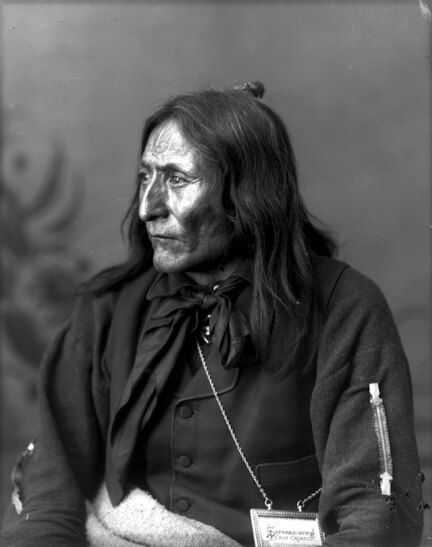
While this lasted it was an anxious time, as many of the Indians, we knew, were dissatisfied that any treaty had been made at all, and a few unruly spirits might in a moment have started a general massacre, out of which none of our small handful could have escaped.
On Monday the payments commenced, and a long and trying time it was. The money, nearly $100,000, was brought by Baker and Company from Benton, and consisted of both American and Canadian bills, from dollar bills to twenties, and as the Indians knew nothing about money, it was most difficult to make them understand the value and amount of what they received.
Tickets were issued to each head of a family, with his name and the number of men, women and children paid; these tickets to be presented at the next payment. It was very difficult to obtain the names and numbers in each family, as the Indians even to-day will not tell their own names, and it is generally necessary to ask a second Indian the name of the first.
They also have some superstition regarding their numbers; so that our work was long and arduous, much patience having to be used. These payments were made by the police officers. I paid the Stonies and Sarcees. It took us a week to get through, but it came to an end at last, and the treaty was finished most satisfactorily. A dinner was given that night in the officer’s mess tent to celebrate the event, and the Hudson’s Bay Company officials and other traders were invited. The dinner was graced by the presence of a few ladies, the wives of the Hudson’s Bay officials and the police officers.
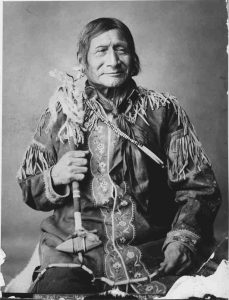
Many speeches were made, and although we had no wine a most pleasant evening was passed. The traders were given a week from the last day of the payment to remain on the groun and trade, after which time they had to move off, and the police of course had to remain to see that all was quiet, and to protect the Indians in their trading, as money was unknown to them, and cheating was most rife. Many instances I remember where an Indian would come to one of us to count his change, after having made a horse or other trade, and we would find that the trader had given him the labels off fruit or other cans as money, the Indian being none the wiser. We would then have to hunt up this man, and either make him return the animal or give the proper change.
Many instances of this kind came under our notice, and the Indians placed the utmost confidence in us to see them justly dealt with. Tens of thousands of dollars were taken in by traders at this treaty, and it was the beginning of wealth to many of them, particularly those dealing in horses.
The Indians held a medicine lodge before they broke up, and many braves were made, for although to-day the making of braves has nearly died out among them, at that time it was at its height, and torture was always practiced. A splinter of wood was passed through the muscles of the breast or back, a rope tied to the top of the medicine pole being fastened to the splinter, when the Indian danced round the pole, until the muscle broke with the strain. They fastened a buffalo skull or tied a horse to themselves in the same manner until it broke loose. They showed great endurance, and the more fortitude they showed, the greater became their standing among the tribe.
A great deal of this took place during the first treaty, as their enemies, the Sioux, being in the country, many war parties were planned to go against them.
The weather had turned cold towards the end of the treaty, and a considerable fall of snow came on, making it far from comfortable under canvas. Towards the end of the last week, word was received that the American government was sending General Terry, as United States commissioner, to interview Sitting Bull at Fort Walsh, and to make terms for his surrender to the United States troops.
Colonel Macleod had to immediately proceed to Fort Walsh, to act for the Canadian government, and to make preparations for meeting General Terry with a suitable escort at the line.
He therefore left early in September with Major Crozier and escort for Fort Macleod, Governor Laird returning across the plains to Battleford. I remained a few days with F troop at the crossing to see the traders all off the ground and then proceeded with that troop to Calgary, at which post we were to winter.
Continued in Winter in Calgary, 1877.







Leave a Reply